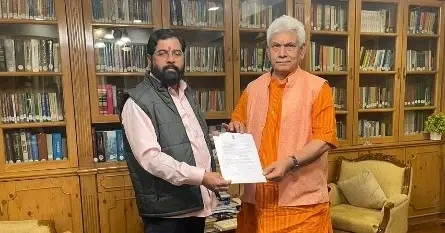Maharashtra to buy land in Kashmir for Rs 8.16 crore to build Bhawan

March 15 (WD) Maharashtra is poised to make history as the first state to acquire land in Jammu and Kashmir to construct a facility catering to tourists and officials visiting the Union Territory. The proposed Maharashtra Bhawan, situated in central Kashmir’s Budgam district on the outskirts of Srinagar city, has received the green light from the Maharashtra cabinet for land acquisition.
The selected plot spans 2.5 acres in Ichgam, near the Srinagar airport, with the Jammu and Kashmir government granting approval for the land transfer upon payment of Rs 8.16 crore.
The Maharashtra government’s endeavor to establish the state’s first Bhawan in the Valley reflects a strategic move to bolster interstate relations and bolster tourism infrastructure.
This significant step follows Maharashtra Chief Minister Eknath Shinde’s visit to Jammu and Kashmir, where discussions with Lt Governor Manoj Sinha in June of the previous year laid the groundwork for this initiative. The envisioned Maharashtra Bhawan aims to provide comfortable accommodations and amenities tailored to the preferences of visitors from Maharashtra, catering to their specific needs and preferences.
The decision to construct a tourist facility in Kashmir aligns with the broader objectives outlined by Maharashtra’s Deputy Chief Minister, Ajit Pawar, who announced plans during the budget speech to develop two state guesthouses in Srinagar and Ayodhya. With an allocated budget of Rs 77 crore, the state government aims to offer superior and secure facilities to tourists and devotees at affordable rates. This commitment underscores the government’s dedication to promoting tourism and pilgrimage while ensuring the safety and comfort of visitors.
The acquisition of land for the Maharashtra Bhawan marks a departure from the previous regulatory landscape in Jammu and Kashmir, where restrictions on land ownership were prevalent before the abrogation of the region’s special status in August 2019.
Formerly, only permanent residents were permitted to purchase land, while the government could lease land to industries and individuals from outside the region for extended periods of up to 99 years. This progressive move signifies a shift towards fostering interstate cooperation and facilitating development initiatives across state boundaries.





